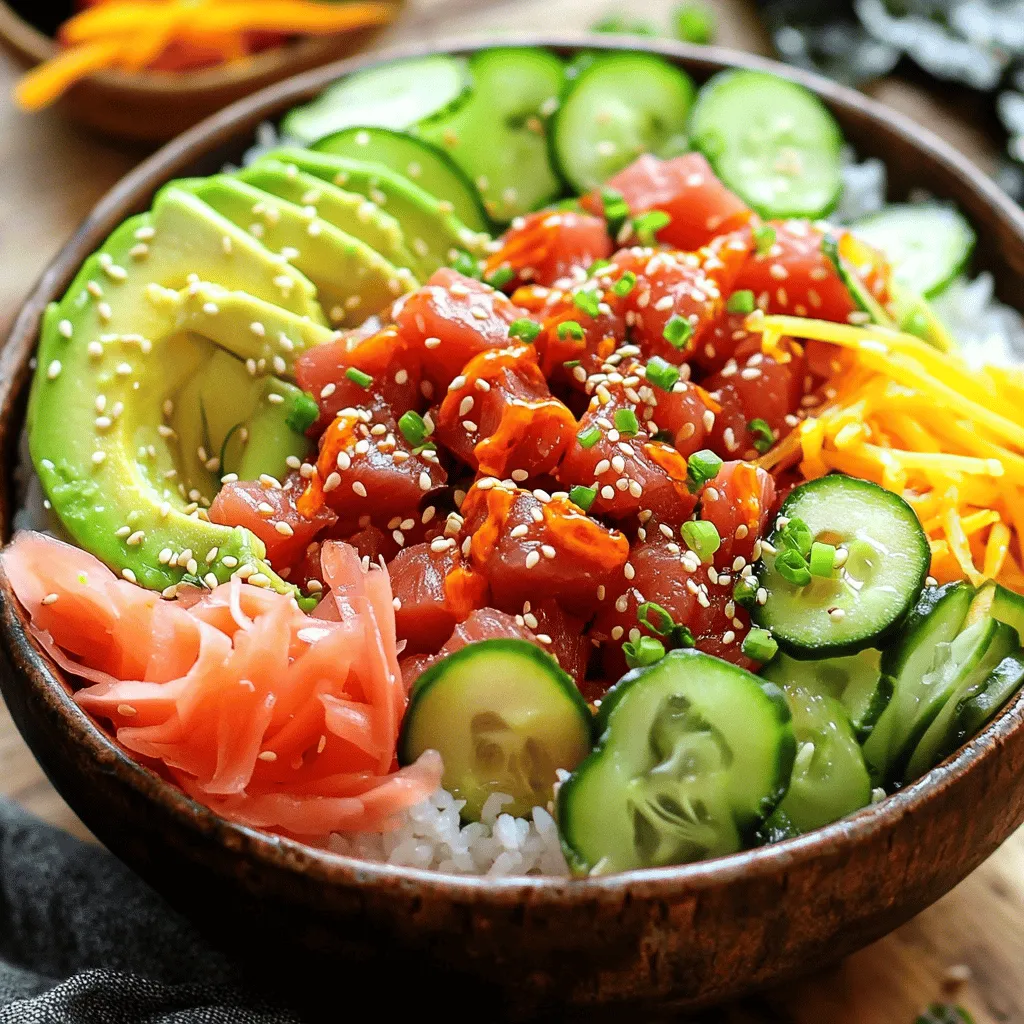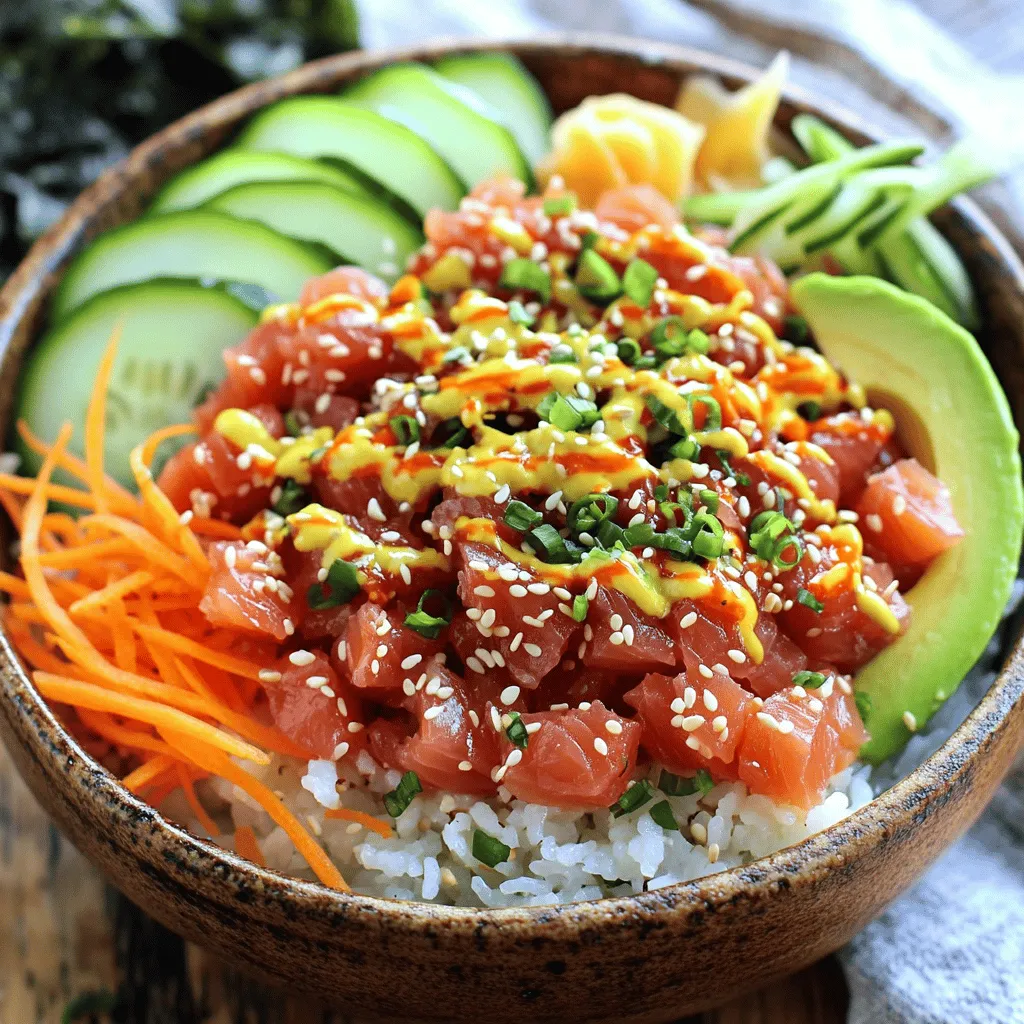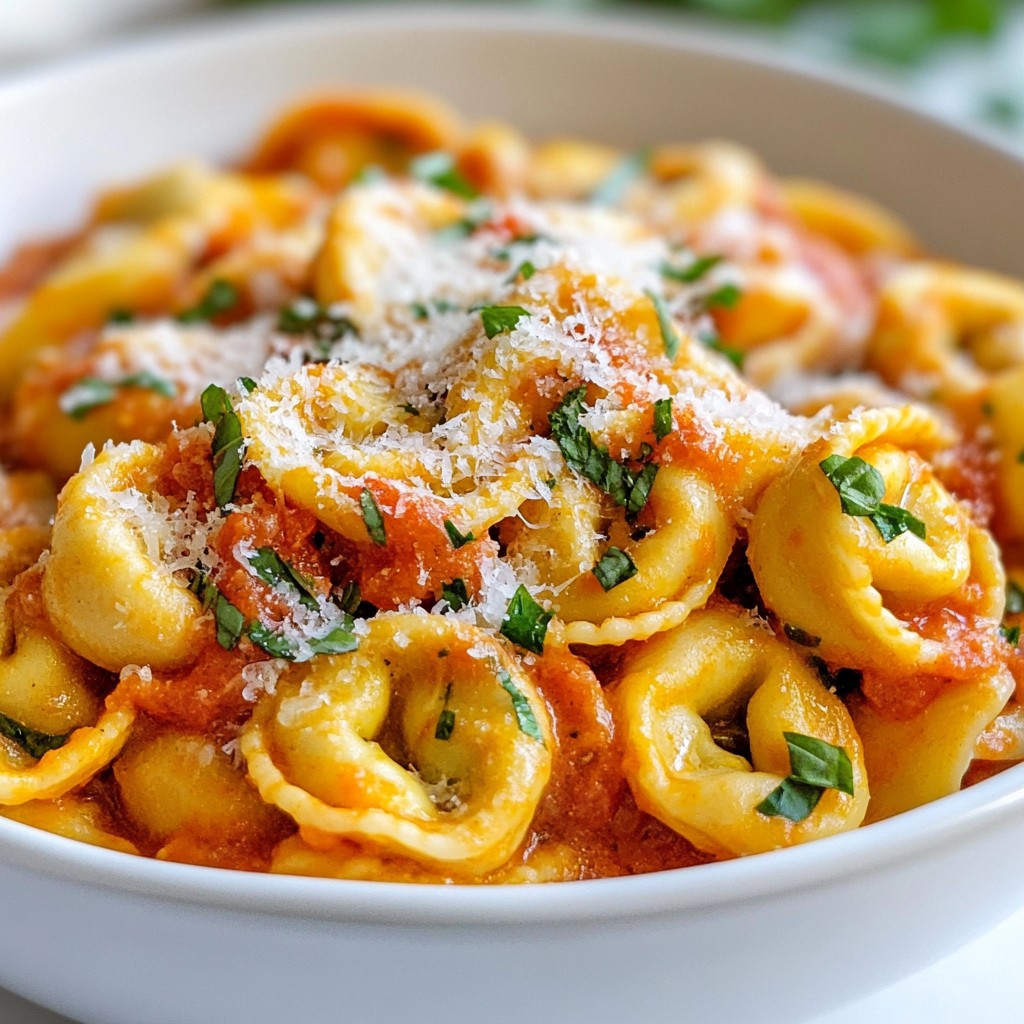Looking to spice up your meal routine? My Spicy Tuna Sushi Bowls are here to help! This easy recipe is perfect for anyone craving bold flavors without the fuss. You’ll discover how to make sushi rice, mix the perfect spicy tuna, and assemble your dish with fresh ingredients. Let’s dive into this tasty adventure and elevate your cooking game with a vibrant, homemade sushi bowl that you can customize to your liking!
Ingredients
Comprehensive Ingredients List
To create delicious spicy tuna sushi bowls, gather these ingredients:
– 1 cup sushi rice
– 1 ¼ cups water
– 1 tablespoon rice vinegar
– 1 teaspoon sugar
– ½ teaspoon salt
– 8 oz sushi-grade tuna, diced
– 2 tablespoons sriracha (more to taste)
– 1 tablespoon mayonnaise (preferably Kewpie)
– 1 ripe avocado, sliced
– 1 small cucumber, julienned
– 1 carrot, shredded
– 2 tablespoons sesame seeds (toasted)
– 2 green onions, finely chopped
– Pickled ginger (for serving)
– Seaweed sheets (optional)
These ingredients blend to create the perfect balance of flavors.
Quality Tips for Ingredients
Choosing the right ingredients is key for great sushi bowls. Here are some tips:
– Sushi Rice: Look for short-grain sushi rice. It sticks well and gives the right texture.
– Tuna: Always use sushi-grade tuna. It should be fresh and bright in color.
– Sriracha: Adjust the amount based on your spice level. Taste as you mix.
– Mayonnaise: Kewpie mayonnaise adds a creaminess that regular mayo lacks.
– Vegetables: Select ripe avocados and fresh vegetables for the best taste.
These tips ensure you use the freshest and highest-quality ingredients.
Nutritional Information per Serving
Each serving of spicy tuna sushi bowls offers a satisfying mix of nutrients:
– Calories: 500
– Protein: 30g
– Carbohydrates: 60g
– Fat: 15g
– Fiber: 5g
This dish provides a balanced meal filled with protein and healthy fats.
Step-by-Step Instructions
Preparation of Sushi Rice
Rinse the sushi rice under cold water. Use a fine-mesh strainer. Swirl the rice gently until clear water runs out. This step removes excess starch, leading to fluffier rice. After rinsing, drain the rice well.
In a medium saucepan, combine your rinsed rice with 1 ¼ cups of water. Bring this mixture to a boil over medium heat. Once boiling, lower the heat to a simmer. Cover the saucepan and let it cook for 18 minutes. Do not lift the lid during cooking. After 18 minutes, remove the pan from heat. Let it rest for 10 minutes while still covered.
Next, prepare the sushi seasoning. In a small bowl, mix rice vinegar, sugar, and salt until dissolved. Once the rice has rested, transfer it to a large bowl. Drizzle the vinegar mixture over the warm rice. Use a wooden spatula to gently fold the rice. Avoid mashing the grains. Cover the rice with a clean kitchen towel to cool it to room temperature.
Mixing the Spicy Tuna
In another bowl, add 8 oz of diced sushi-grade tuna. Pour in 2 tablespoons of sriracha and 1 tablespoon of mayonnaise. Mix until the tuna is well coated. You can add more sriracha if you want more heat. This spicy tuna mix is key to the flavor of the bowls.
Assembling the Sushi Bowls
Now, it’s time to build your sushi bowls. Start by dividing the seasoned sushi rice into two serving bowls. Create a nice bed for the toppings. Spoon the spicy tuna mixture generously over the rice.
Next, add slices of avocado, julienned cucumber, and shredded carrots on top. This adds color and texture. Finish with a sprinkle of toasted sesame seeds and chopped green onions. These toppings enhance both flavor and visual appeal.
Serve your bowls with pickled ginger on the side. This adds a refreshing contrast. If you like, add strips of seaweed for extra crunch. Enjoy your spicy tuna sushi bowls!
Tips & Tricks
Enhancing Flavor and Texture
To make your spicy tuna sushi bowls pop, focus on fresh ingredients. Fresh sushi-grade tuna makes a big difference in flavor. Use ripe avocados for creaminess. Toasted sesame seeds add a nice crunch. Also, mix different textures. The creamy avocado, crunchy cucumber, and soft tuna all work together well. Don’t forget the pickled ginger; it cleanses your palate and adds zing.
Common Mistakes to Avoid
Avoid overcooking the sushi rice. This can make it mushy and sticky. Rinse the rice well until the water runs clear. This step removes excess starch. Be careful when mixing the sushi seasoning into the rice. You want to fold it gently to keep the grains intact. Lastly, don’t skip the resting time after cooking the rice. This helps the rice become fluffy.
Customizing the Spicy Tuna Sushi Bowls
You can easily customize your bowls. Want more heat? Add extra sriracha or a dash of chili oil. If you prefer milder flavors, reduce the sriracha. You can also swap the tuna for salmon or shrimp. For a vegetarian option, use tofu or tempeh. Add seasonal veggies like radishes or bell peppers for variety. The possibilities are endless, so feel free to experiment!

Variations
Alternative Proteins to Use
If you want to switch things up, try different proteins. Salmon works great and adds a rich flavor. You can also use cooked shrimp, crab, or even tofu for a twist. These options give you tasty choices while keeping the dish fresh.
Vegetarian and Vegan Options
For a vegetarian or vegan version, swap the tuna for marinated tofu or tempeh. You can also use chickpeas for a protein boost. Add extra veggies like bell peppers or radishes for crunch. Mix in avocado and a soy sauce dressing for a creamy touch. These changes keep the bowl filling and flavorful.
Seasonal Vegetables for Freshness
Using seasonal vegetables can enhance your sushi bowls. In spring, try snap peas or asparagus. In summer, add ripe tomatoes or zucchini. Fall brings sweet butternut squash and kale. In winter, use hearty root vegetables like turnips or beets. Fresh seasonal produce makes each bowl unique and delicious.
Storage Info
How to Store Leftovers
To store leftovers, place any uneaten spicy tuna sushi bowls in airtight containers. Cover them tightly to keep air out. The sushi rice will dry out if not stored properly. You can keep the bowls in the fridge for up to two days. However, the tuna is best when fresh.
Best Practices for Reheating
Reheating sushi bowls can be tricky. I recommend only reheating the rice. To do this, add a splash of water to the rice and cover it. Use the microwave in short bursts, stirring in between. This keeps the rice moist. Avoid reheating the tuna. It tastes best fresh and loses texture when reheated.
Freezing Instructions and Considerations
Freezing sushi bowls is not ideal. The rice can become mushy, and the tuna loses flavor and texture. If you must freeze, store the rice and tuna separately. Use freezer-safe bags for the rice and a container for the tuna. You can freeze for up to one month. When ready to eat, thaw in the fridge overnight. Then, reheat the rice as mentioned above. Enjoy your meal fresh for the best taste!
FAQs
What is the best type of tuna for sushi bowls?
The best type of tuna for sushi bowls is sushi-grade tuna. This means it is fresh and safe to eat raw. Look for yellowfin or bluefin tuna. They are both tasty and have a nice texture. Always ask your fishmonger for the freshest option available.
Can I make spicy tuna sushi bowls ahead of time?
Yes, you can make spicy tuna sushi bowls ahead of time. Cook the rice and prepare the spicy tuna mixture. Store them separately in the fridge. Assemble the bowls just before serving to keep everything fresh and tasty.
How do I adjust the spiciness of the dish?
To adjust the spiciness of your sushi bowls, change the amount of sriracha. Start with two tablespoons, then taste. If you like it spicier, add more sriracha. You can also mix in a bit of wasabi for extra heat. Enjoy finding your perfect balance!
This blog covered how to make spicy tuna sushi bowls. We discussed essential ingredients and quality tips. I shared step-by-step instructions for rice, tuna, and assembly. You learned tricks to enhance flavor and avoid mistakes. We also explored various protein options and how to store your bowls.
Making these sushi bowls at home can be fun and rewarding. Use the tips to create your best version. Enjoy your delicious bowls!




